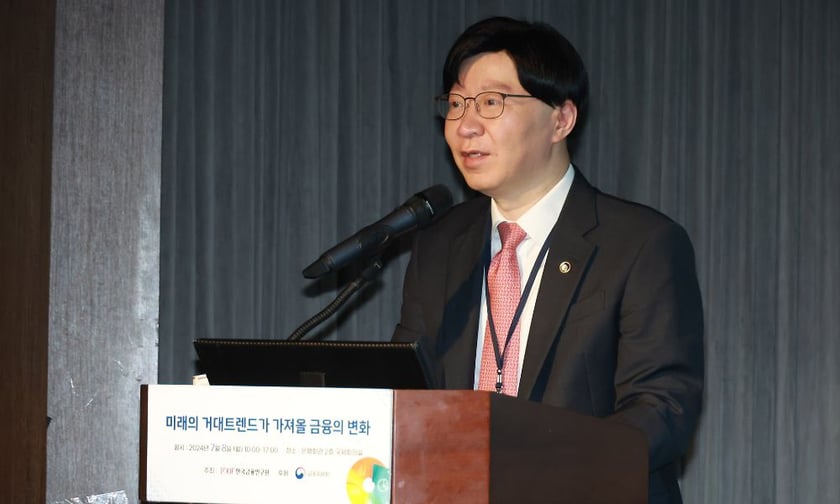

South Korean Financial Services Commission (FSC) vice chairman Kim Soyoung delivered a keynote address at a seminar on future finance, organised by the Korea Institute of Finance and supported by the FSC.
The seminar, themed “Future Megatrends and Impending Changes in the Financial Sector,” brought together experts from both the public and private sectors to explore the effects of demographic changes, climate change, and technological advancements on the financial market.
In his speech, Kim (pictured) emphasised the necessity for the financial industry and the government to adopt forward-thinking measures to ensure sustainable growth.
He underscored the importance of preparing for medium- to long-term changes in the financial landscape rather than just addressing immediate issues.
“Against the backdrop of rapidly changing financial environments and market conditions, the authorities have been thus far mostly focused on responding to issues that needed to be addressed urgently. However, since financial policy can have a significant impact on the structural and macro-level changes, it is important that the authorities set their sight on a medium- to long-term horizon when formulating policy responses. In this regard, the authorities are working on policy frameworks for future finance, based on systematic analyses intended to minimise risks and seek opportunities for growth over a medium- to long-run,” he said.
Kim highlighted three primary policy areas that could help South Korean financial industry achieve sustainable growth:
Mitigation policies aim to lessen the impact of significant changes and decelerate their progression.
Adaptation policies are designed to minimise potential damage and facilitate adjustment to new conditions, while innovation policies focus on transforming challenges into growth opportunities through new regulatory frameworks.
Discussing demographic shifts, Kim noted the challenges posed by rising costs and slower economic growth in an aging society.
He suggested that the financial sector needs to meet the increasing demand for services tailored to the elderly, such as long-term care, medical, and pension services. Furthermore, demographic changes could enable financial companies to diversify their profit strategies by offering products targeted at different age groups.
“The changing demographic structure also presents opportunities for financial companies to seek diversification in their profit seeking strategies, through which they can offer products tailored to the needs of specific age groups to ensure the supply of financial products suitable for customers’ lifecycle needs,” he said. “In this regard, it is important to continue to implement financial policies aimed at boosting birth rate and the size of working age population, such as the lending support for young adults (‘mitigation’ policy), alongside the measures to bolster financial safety net for the elderly (‘adaptation’ policy) and broaden the availability of services targeted at old age groups (‘innovation’ policy).”
On the topic of climate change, Kim emphasised the need for substantial funding to address long-term climate challenges. He acknowledged the financial sector’s exposure to climate risks but highlighted the significant investment opportunities in the growing climate-related financial markets.
“To this end, the financial sector needs to contribute to greenhouse gas reduction and low carbon emission. In this regard, in March this year, five policy financial institutions announced their plans to supply KRW420 trillion in total to combat climate risks until 2030 (‘mitigation’ policy). It is also important to continue to carry out joint stress tests (with the Bank of Korea and the Financial Supervisory Service) on financial sectors to ensure prudential management (‘adaptation’ policy), while seeking ways to develop climate related financial products, promote green finance, and provide support for climate technologies (‘innovation’ policy),” he said.
Kim also discussed the impact of technological advancements, such as AI-driven fintech services and the merging of financial and non-financial services.
“While new technologies provide opportunities for the financial industry, they also present downside risks, such as the potential for market instability, or damage to consumer rights and interests, which also need to be taken into account,” he said.
He recommended measures to ensure AI accountability, enhance data security, and prevent accidents, alongside updating regulations and infrastructure to support big data analytics.
